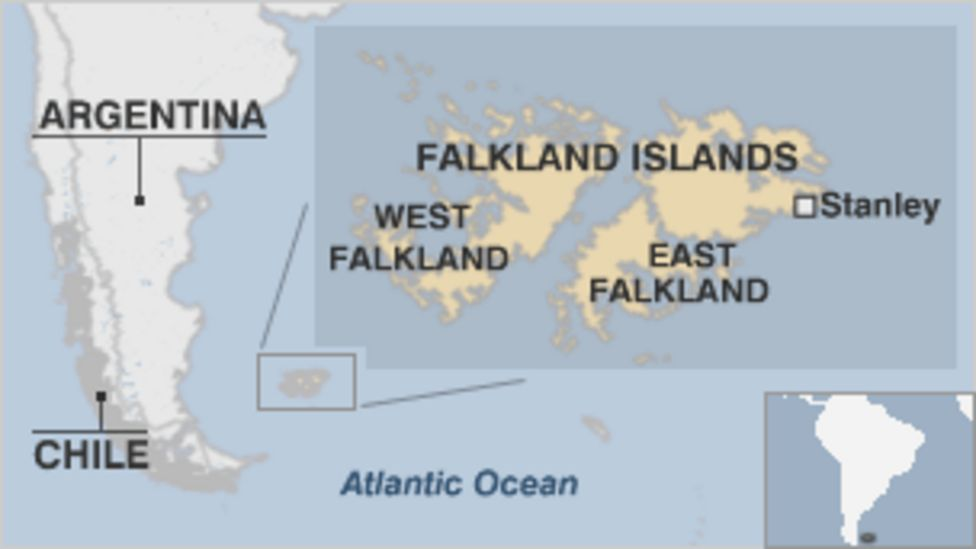International Relations
Falkland Islands Issue
- 09 Feb 2022
- 6 min read
For Prelims: Location of Falkland Island and its Neighborhood, Conflict of Falkland Islands.
For mains: Effect of Policies & Politics of Countries on India's Interests, India and its Neighborhood, Conflict of Falkland Islands.
Why in News
Recently, Britain rejected a statement from China that affirmed it’s support for Argentina’s claim to the Falkland Islands.
- Earlier, China and Argentina issued a joint statement that said China “reaffirms its support for Argentina’s demand for the full exercise of sovereignty over the Malvinas Islands (Falkland Islands),” using the Argentine name for the territory.
What and Where is Falkland Island?
- Falkland Islands, also called Malvinas Islands or Spanish Islas Malvinas, internally self-governing overseas territory of the United Kingdom in the South Atlantic Ocean.
- It lies about 300 miles northeast of the southern tip of South America and a similar distance east of the Strait of Magellan.
- The capital and major town is Stanley, on East Falkland, there are also several scattered small settlements as well as a Royal Air Force base that is located at Mount Pleasant.
- The two main islands, East Falkland and West Falkland, and about 200 smaller islands. The government of the Falkland Islands also administers the British overseas territory of South Georgia and the South Sandwich Islands, including the Shag and Clerke rocks.
What is the History of the Falkland Islands?
- The British, in 1765, were the first to settle West Falkland, but they were driven off in 1770 by the Spanish, who had bought out the French settlement about 1767.
- The British outpost on West Falkland was restored in 1771 after threat of war, but then the British withdrew from the island in 1774 for economic reasons, without renouncing their claim to the Falklands.
- Spain maintained a settlement on East Falkland (which it called Soledad Island) until 1811.
- In 1820 the Argentina Government, which had declared its independence from Spain in 1816, proclaimed its sovereignty over the Falklands.
- In 1831 the US warship destroyed the Argentine settlement on East Falkland in reprisal for the arrest of three US ships that had been hunting seals in the area.
- In early 1833, a British force expelled the few remaining Argentine officials from the island without firing a shot. In 1841, a British civilian lieutenant governor was appointed for the Falklands, and by 1885 a British community of some 1,800 people on the islands was self-supporting.
- Argentina regularly protested Britain’s occupation of the islands.
- After World War II (1939-45) the issue of sovereignty over the Falkland Islands shifted to the United Nations (UN) when, in 1964, the islands’ status was debated by the UN committee on decolonization.
- In 1965, the UN General Assembly approved a resolution inviting Britain and Argentina to hold discussions to find a peaceful solution to the dispute.
- These protracted discussions were still proceeding in February 1982, but in April Argentina’s military government invaded the Falklands.
- This act started the Falkland Islands War, which ended 10 weeks later with the surrender of the Argentine forces at Stanley to British troops who had forcibly reoccupied the islands.
- Although Britain and Argentina reestablished full diplomatic relations in 1990, the issue of sovereignty remained a point of contention.
- In the early 21st century Britain continued to maintain some 2,000 troops on the islands.
- In January 2009 a new constitution came into effect that strengthened the Falklands’ local democratic government and reserved for the islanders their right to determine the territory’s political status. In a referendum held in March 2013, islanders voted nearly unanimously to remain a British overseas territory.
What is the Basis of Different Claims on the Island?
- Argentina based its claim to the Falklands based on an official document of 1493 modified by the Treaty of Tordesillas (1494), by which Spain and Portugal had divided the New World between themselves; on succession from Spain; on the islands’ proximity to South America, and on the need to end a colonial situation.
- Britain based its claim on its “open, continuous, effective possession, occupation, and administration” of the islands since 1833 and its determination to apply to the Falklanders the principle of self-determination as recognized in the United Nations Charter.
- Britain asserted that, far from ending a colonial situation, Argentine rule and control of the lives of the Falklanders against their wishes would in fact create one.





